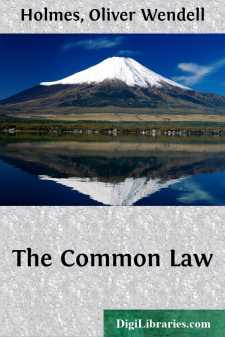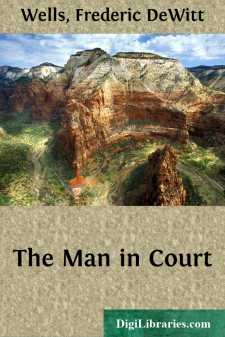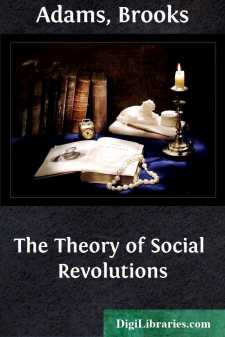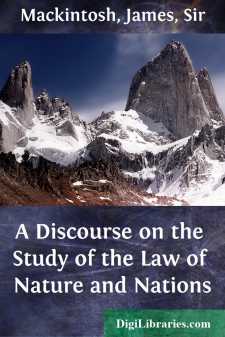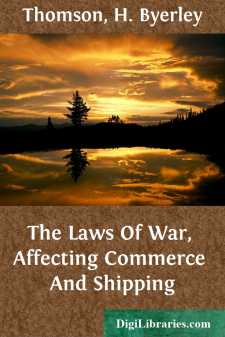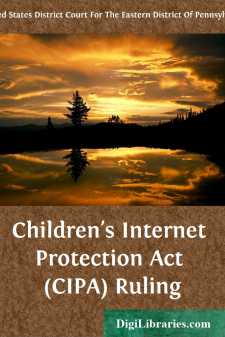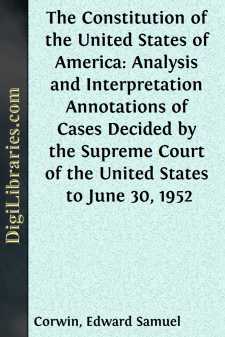Law
- Commercial 1
- Common 1
- Computer & Internet 1
- Constitutional 4
- Courts 3
- General 3
- International 1
- Military 1
- Natural Law 1
- Property 1
Law Books
Sort by:
In this matter the general conclusion follows from a single instance. For the moment it is admitted that in one case knowledge of a present fact, such as the other party's intent to act on the false statement, dispenses with proof of an intent to induce him to act upon it, it is admitted that the lesser element is all that is necessary in the larger compound. For intent embraces knowledge...
more...
The correspondence of P. J. Proudhon, the first volumes of which we publish to-day, has been collected since his death by the faithful and intelligent labors of his daughter, aided by a few friends. It was incomplete when submitted to Sainte Beuve, but the portion with which the illustrious academician became acquainted was sufficient to allow him to estimate it as a whole with that soundness of...
more...
I In the Night Court the drama is vital and throbbing. As the saddest object to contemplate is a play where the essentials are wrong, so in this court the fundamentals of the law are the cause of making it an uncomfortable and pathetic spectacle. The women who are brought before the Night Court are not heroines, but the criminal law does not seem better than they. It makes little attempt to mitigate...
more...
CHAPTER I COMMON SENSE FARMING The three things essential to all wealth production are land, labor, and capital. "The dry land" was created before there appeared the man, the laborer, to work it. With his bare hands the worker could have done nothing with the land either as a grazer, a farmer or a miner. From the very first he needed capital, that is, the tools to work the land. The first tool...
more...
by:
Brooks Adams
CHAPTER I THE COLLAPSE OF CAPITALISTIC GOVERNMENT Civilization, I apprehend, is nearly synonymous with order. However much we may differ touching such matters as the distribution of property, the domestic relations, the law of inheritance and the like, most of us, I should suppose, would agree that without order civilization, as we understand it, cannot exist. Now, although the optimist contends that,...
more...
by:
James Mackintosh
Before I begin a course of lectures on a science of great extent and importance, I think it my duty to lay before the public the reasons which have induced me to undertake such a labour, as well as a short account of the nature and objects of the course which I propose to deliver. I have always been unwilling to waste in unprofitable inactivity that leisure which the first years of my profession...
more...
INTRODUCTION TO PART I. It would be superfluous to trouble my readers, in a concise practical treatise, with any theoretical discussion on the origin of the Law of Nations, had not questions of late been often asked, respecting the means of accommodating rules decided nearly half-a-century ago, to those larger views of international duty and universal humanity, that have been the natural result of a...
more...
1. Preliminary Statement This case challenges an act of Congress that makes the use of filtering software by public libraries a condition of the receipt of federal funding. The Internet, as is well known, is a vast, interactive medium based on a decentralized network of computers around the world. Its most familiar feature is the World Wide Web (the "Web"), a network of computers known as...
more...
by:
Anonymous
INTRODUCTION The legal history of Rome begins properly with the Twelve Tables. It is strictly the first and the only Roman code,[1] collecting the earliest known laws of the Roman people and forming the foundation of the whole fabric of Roman Law. Its importance lies in the fact that by its promulgation was substituted for an unwritten usage, of which the knowledge had been confined to some citizens of...
more...
INTRODUCTION It is my purpose in this Introduction to the Constitution of the United States, Annotated to sketch rapidly certain outstanding phases of the Supreme Court's interpretation of the Constitution for the illustration they may afford of the interests, ideas, and contingencies which have from time to time influenced the Court in this still supremely important area of its powers and of the...
more...


